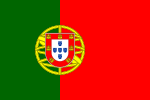Corruption in Portugal
| Political corruption |
|---|
 |
| Forms and concepts |
| Anti-corruption |
| Corruption by continent and country |
Corruption in Portugal is examined on this page.
Extent
Transparency International’s Global Corruption Barometer 2013 reveals that political parties, Parliament, the judiciary and the military are the most corrupt institutions in Portugal.[1]
The exposure of high-profile corruption cases in the media and the limited political engagement have contributed to poor public perception of political corruption in Portugal. Recurring corruption scandals involving high-level politicians, local administrators and businesses abusing public funds have revealed that safeguards to counter corruption and abuse of power have been relatively inefficient, according to the National Integrity System Assessment 2012 by the Portuguese chapter of Transparency International (TIAC).[2][3]
Regarding business and corruption, several sources indicate that corruption plays a limited role in Portugal's business culture. Foreign companies reportedly encounter limited corruption, but they do not consider corruption an obstacle for foreign direct investment.[4][5] Access to financing and inefficient government bureaucracy are considered the most problematic factors for doing business, according to the surveyed business executives from World Economic Forum Global Competitiveness Report 2013-2014.[6]
The EU report on corruption, revealed that the Portuguese perceive the a high level of corruption (with 90% answering that corruption is widespread, compared to an EU average of 76%). However, the same report reveals that, when asked if they had actually witness corruption, only 1% responded positively (with an EU average of 5%).[7]
See also
References
- ^ "Global Corruption Barometer 2013". Transparency International’s. Retrieved 6 December 2013.
- ^ "the National Integrity System Assessment 2012" (PDF). The Portuguese chapter of Transparency International (TIAC).
- ^ "Snapshot of the Portugal Country Profile". Business Anti-Corruption Portal. Retrieved 6 December 2013.
- ^ "2013 Investment Climate Statement - Portugal". US Department of State. Retrieved 6 December 2013.
- ^ "2013 Index of Economic Freedom- Portugal". Heritage Foundation. Retrieved 6 December 2013.
- ^ "Global Competitiveness Report 2013-2014". World Economic Forum. Retrieved 6 December 2013.
- ^ EU Anti-Corruption Report – Portugal country sheet, http://ec.europa.eu/dgs/home-affairs/what-we-do/policies/organized-crime-and-human-trafficking/corruption/anti-corruption-report/docs/2014_acr_portugal_factsheet_en.pdf
External links

